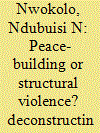|
|
|
Sort Order |
|
|
|
Items / Page
|
|
|
|
|
|
|
| Srl | Item |
| 1 |
ID:
178262


|
|
|
|
|
| Summary/Abstract |
Drought is a major challenge threatening agricultural productivity in uMsinga. The occurrence of drought is expected to increase in coming decades, intensifying in severity, duration and the way people are affected by drought. The objective of this study is to understand small-scale farmers’ and rural communities’ perceptions of drought, its environmental and socio-economic impacts, adaptive and mitigation measures at household level and their satisfaction with the government’s role in drought management in the community. The study utilized a combination of quantitative and qualitative research methods, in the form of questionnaires, focus groups and key informant interviews. The sample size for the research study was 180 respondents for the questionnaire component and a total of 30 respondents for the focus groups and key informant interviews. The results show that increased levels of poverty, food insecurity and increased migration were the main socio-economic impacts perceived by respondents. Water scarcity, crop failure, forest degradation and an increase in average temperatures were perceived by respondents as the main environmental impacts caused by drought in uMsinga. Respondents perceived drought as a serious threat to agricultural production and adopted various indigenous adaptive strategies. A majority of respondents adopted a reactive approach to drought management, and therefore did not adopt many mitigation measures.
|
|
|
|
|
|
|
|
|
|
|
|
|
|
|
|
| 2 |
ID:
172101


|
|
|
|
|
| Summary/Abstract |
There is a great conviction that the International Court of Justice’s ruling in 2002 on the Bakassi boundary dispute between Nigeria and Cameroon, and Nigeria’s decision to obey the ruling may have stopped a fierce inter-state war over the boundary. Indeed, many then ascribed to the whole boundary demarcation process as peacebuilding, disregarding the structural changes marked by the violence of forced migration. This article explores how the boundary delimitation has produced particular sorts of structural violence characterised by state neglect, loss of livelihoods and destitution. Thus, the article argues that although a full-blown war was avoided, the socio-economic conditions of the Nigerian populations on both sides of the border were not adequately considered and guaranteed as part of the peace-building agenda. It further argues that Nigeria, like many post-colonial states with the concentration of developments in major cities, neglects rural and border communities. Thus, the border communities accommodating the former Bakassi residents have further degenerated into ‘ill-governed’ spaces. This article uses structural violence as a framework to analyse the primary and secondary data to provide some deeper insights into the issues of violence being experienced by the local populations living on both sides of the demarcated border.
|
|
|
|
|
|
|
|
|
|
|
|
|
|
|
|
| 3 |
ID:
094581


|
|
|
|
|
| Publication |
New Delhi, Anmol Publications Pvt. Ltd., 2004.
|
| Description |
xiv, 315p.
|
| Standard Number |
8126117184
|
|
|
|
|
|
|
|
|
|
|
|
Copies: C:1/I:0,R:0,Q:0
Circulation
| Accession# | Call# | Current Location | Status | Policy | Location |
| 054795 | 337.16605412/NED 054795 | Main | On Shelf | General | |
|
|
|
|
|
|
|
|
|